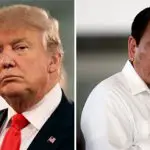President Rodrigo Duterte declared Martial Law over Mindanao late evening on May 23 while he was on official visit in Russia hours after a local terrorist group burned several installations in Marawi City. It will last for 60 days.
[ads2]
Netizens have mixed reactions to the declaration of martial law in Mindanao, with some terrified or concerned about how it might bring back bad memories among the martial law victims and others expressing their trust in the government troops.
Upon making his proclamation, President Duterte said that he is going to be harsh.
“I’ll be harsh. Martial law is martial law… kayong mga kababayan ko, you have experienced martial law… it would not be any different from what President Marcos did,” Duterte told Communications Assistant Secretary Mocha Uson in an exclusive interview.
“Don’t be too scared. I’m going home I’m cutting my visit here [Russia] to be with my countrymen. And I will deal with the problem once I arrive,” Dutrete added.
As to how long the martial law may last, Duterte said, “If it would take a year to go then… I will do it. If it is over within a month then I’ll be happy.”
But what can the President do, as provided by the 1987 Constitution, after declaring Martial Law?
It can be found in Article Seven, Section 18 of the 1987 Philippine Constitution.
[ads1]
When can the President declare martial law?
“The President shall be the Commander-in-Chief of all armed forces of the Philippines and whenever it becomes necessary, he may call out such armed forces to prevent or suppress lawless violence, invasion or rebellion. In case of invasion or rebellion, when the public safety requires it, he may, for a period not exceeding sixty days, suspend the privilege of the writ of habeas corpus or place the Philippines or any part thereof under martial law,” the Constitution reads.
But the President needs to submit a report to Congress, which may revoke the President’s proclamation or extend it.
“Within forty-eight hours from the proclamation of martial law or the suspension of the privilege of the writ of habeas corpus, the President shall submit a report in person or in writing to the Congress. The Congress, voting jointly, by a vote of at least a majority of all its Members in regular or special session, may revoke such proclamation or suspension, which revocation shall not be set aside by the President. Upon the initiative of the President, the Congress may, in the same manner, extend such proclamation or suspension for a period to be determined by the Congress, if the invasion or rebellion shall persist and public safety requires it,” it added.
If the congress is not in session, this is what should happen: “The Congress, if not in session, shall, within twenty-four hours following such proclamation or suspension, convene in accordance with its rules without need of a call.”
The Supreme Court may also be involved by reviewing the grounds of the proclamation of martial law.
“The Supreme Court may review, in an appropriate proceeding filed by any citizen, the sufficiency of the factual basis of the proclamation of martial law or the suspension of the privilege of the writ of habeas corpus or the extension thereof, and must promulgate its decision thereon within thirty days from its filing,” the Constitution states.
Despite the declaration of martial law, the Constitution remains in force.
“A state of martial law does not suspend the operation of the Constitution, nor supplant the functioning of the civil courts or legislative assemblies, nor authorize the conferment of jurisdiction on military courts and agencies over civilians where civil courts are able to function, nor automatically suspend the privilege of the writ of habeas corpus,” it added.
“The suspension of the privilege of the writ of habeas corpus shall apply only to persons judicially charged for rebellion or offenses inherent in, or directly connected with, invasion.”
“During the suspension of the privilege of the writ of habeas corpus, any person thus arrested or detained shall be judicially charged within three days, otherwise he shall be released,” the 1987 Constitution reads.
Former dean of Ateneo School of Government Antonio La Viña also defined what martial law is not in his interview in ANC.
La Viña emphatically said that a declaration of martial law does not automatically mean the suspension of the privilege of the writ of habeas corpus, which meant that people cannot be arrested without a warrant of arrest. He added that there should a separate declaration for the suspension of the privilege of the writ of habeas corpus, or it should at least be mentioned in the declaration of martial law.
You can watch his interview here:
What is martial law and what is it not? Atty. Tony La Viña discusses that in this #ANCRecap. #ANCEarlyEdition pic.twitter.com/jd706TNcTG
— ABS-CBN News Channel (@ANCALERTS) May 23, 2017
Sources: ( gmanetwork.com , rappler.com )


